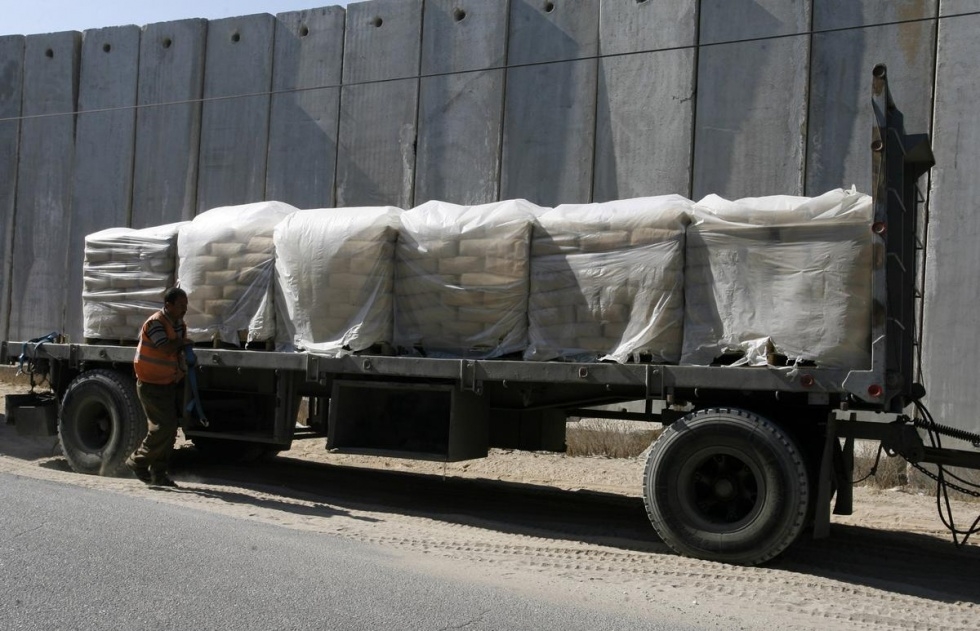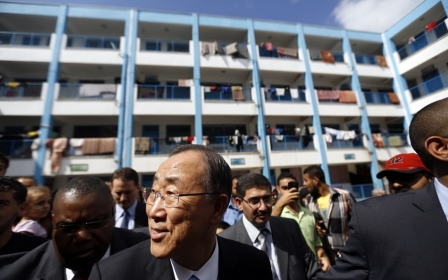A chink in the wall

Tuesday was supposed to be an important day for Gazan farmers. Prevented from marketing their products in Israel or in the West Bank for the last seven years, Israel allowed two trucks of dates and sweet potatoes to exit Gaza and travel the 40 kilometre distance to the West Bank. But even this extremely modest measure failed. The trucks were not allowed to pass the Kerem Shalom crossing because the food packaging was not marked "made in Gaza." The trucks drove back to where they came from and Palestinian farmers lost some 45,000 shekels ($12,500) on packing and transportation.
This small example represents the fragile state of the Israeli siege on Gaza. There is certainly a change in atmosphere: Major General, Benny Gantz was quoted a few days ago, saying that Gaza should "be opened up" to the outside world so that "hope will be two inches ahead of despair." Israeli Defence Minister, Moshe Yaalon added today that new measures agreed upon by Israel, the Palestinian Authority and the United Nations "will enable Gazans to live." Some symbolic gestures, such as allowing 1,500 Gazans to travel to Jerusalem and pray in Al-Aqsa during the recent Eid al-Adha, were already taken.
But so far, these measures are just a drop in the sea. Take for example, the export out of Gaza. Until 2007, 87 percent of exports from Gaza - agriculture goods, but also clothing, furniture etcetera - went either to Israel or to the West Bank. After Hamas took over Gaza, Israel banned this export altogether, putting the Gazan economy at a total standstill. Gaza has no chance to recover or even to survive without a revival of this export. However symbolic, a truck of sweet potatoes will not perform this miracle.
Eitan Diamond, executive director for Gigha (Access), an Israeli organization which supports freedom of movement for Palestinians, claimed that it is quite clear this export ban had to do with politics, not with security. While banning export to Israel and the West Bank, he noticed, the Israelis allowed for goods coming out of Gaza to be exported abroad through Ashdod seaport or Ben Gurion airport, two extremely sensitive spots. "It is difficult to say that the export ban had a security justification," he said.
Diamond claimed that Israel is justified to control what is coming in or out of Gaza, but the ban on the movement of goods and people was disproportionate. "Goods and people are not a danger per se," he said. According to Diamond, there was never a coherent Israeli response as to why the siege on Gaza was needed. One explanation was to stress the difference between Hamas-controlled Gaza and the Fatah-controlled West Bank, hoping that it would drive Gazans to topple their Islamic government. The fact that it didn't happen didn't change much.
"After the Mavi Marmara incident, Dan Meridor (former Israeli intelligence minister) asked why the siege was needed," said Diamond. "Ehud Barak (then Israeli defense minister) replied that it is out of inertia. Barak explained that there was an idea to differentiate between Gaza and the West Bank and they just carried on with it."
Yet the Marmara incident in 2010, where Israeli troops killed nine Turkish passengers on a naval convoy bringing food into Gaza, did bring some change. Put under international pressure, Israel found it hard to justify why it is banning coriander or toys from going into Gaza while allowing for cinnamon or combs to pass the crossings. Except for construction materials, which were considered of "dual use," meaning they could serve military purposes, most goods were allowed from Israel into Gaza.
There was no lack of goods in the Gazan markets. The problem was that people did not have money to buy them. Before the Second Intifada, tens of thousands of Gazans worked in Israel. From the year 2000 onwards, their number dropped dramatically, till they came to a stop after 2007. As the markets in Israel and the West Bank were also closed to goods from Gaza, and as trade through the tunnels under the Egyptian border in Rafah was heavily interrupted after General Sisi came to power in Egypt in 2013, it is understandable why Hamas managed to unite the Gazan population under the unequivocal demand that the siege be lifted.
During Operation Protective Edge, Israel refused to accept these demands and even denied that Gaza is under siege at all. In the ceasefire agreement, which put an end to the deadly 50- day conflict, the words “ending the siege” did not appear. But it is clear that something has changed in Israel. The statement by Gantz quoted above indicates that the Israeli military establishment not only acknowledges the difficult situation in Gaza, it also deems that it is in Israel's interests to improve it.
There are some signs of actual change: 75 trucks carrying construction materials entered Gaza this week, probably after an elaborated control system was agreed upon between Israel, the Palestinian Authority, United Nations and Egypt, as reported on an Israel news website this week. The two trucks stopped yesterday at Kerem Shalom crossing are supposed to be the beginning of a renewal of agricultural export from Gaza to the West Bank. There are indications that Israel will allow for 5,000 Gazans to begin working in Israel.
It is much too early to say that the siege is over or even largely relieved, but it seems that the last war in Gaza did change the Israeli way of thinking, at least in the army. "The army was always less bent on total siege than the Ministry of Defence," explained Shaul Arieli, an ex-colonel who is now affiliated with the Left. "Now, after Defensive [Protective] Edge, the army understood that the people of Gaza were pushed against the wall, that they had nothing to lose, and that if the situation will not be alleviated, nothing will change."
Ironically, says Arieli, it was Yaalon who always talked about "scorching the conscience" of Palestinians by using extensive force against them. In a certain sense, estimates Arieli, it was Hamas who "scorched" Israeli conscience this time. Hamas' fighting capabilities in Protective Edge were high, says Arieli, both in its command and control as well as in its combat units. Ganz himself is quoted today as saying, in reference to Hamas fighters, that they did things which "not-brave people cannot do."
This is not to say that the army feels defeated, says Arieli. "The army knows that if it will not be restricted, it can occupy Gaza." But at the same time, the army understands that without these restrictions, the death toll among Palestinians will be huge, and therefore it will be impossible to achieve politically.
So easing the siege suddenly seems like a better option than continuing the inhumane pressure on 1.8 million Palestinians. The question is how far Israel is willing to go. The army, and the military establishment as a whole, seems to understand that a change is needed. Or maybe they understand that it is at least necessary to speak about a change, to create an atmosphere of change, without changing the essence of the siege. "The change of rhetoric is welcomed," said Diamond, "but it is not yet backed by changes on the ground."
As Israel preferred not admit publicly its seven years long siege on Gaza, it seems that now it prefers not to make public its decision to ease it. This may be for political reasons, as such a move might be depicted as accepting Hamas' conditions during the war. Or more probably, Israel is not yet convinced it wants to give up this tactic.
Photo credit: Trucks carrying construction materials cross into the Gaza Strip at the Karam Abu Salem (Kerem Shalom) border crossing into the southern Gaza Strip on October 14, 2014 (AA)
Stay informed with MEE's newsletters
Sign up to get the latest alerts, insights and analysis, starting with Turkey Unpacked
Middle East Eye delivers independent and unrivalled coverage and analysis of the Middle East, North Africa and beyond. To learn more about republishing this content and the associated fees, please fill out this form. More about MEE can be found here.





